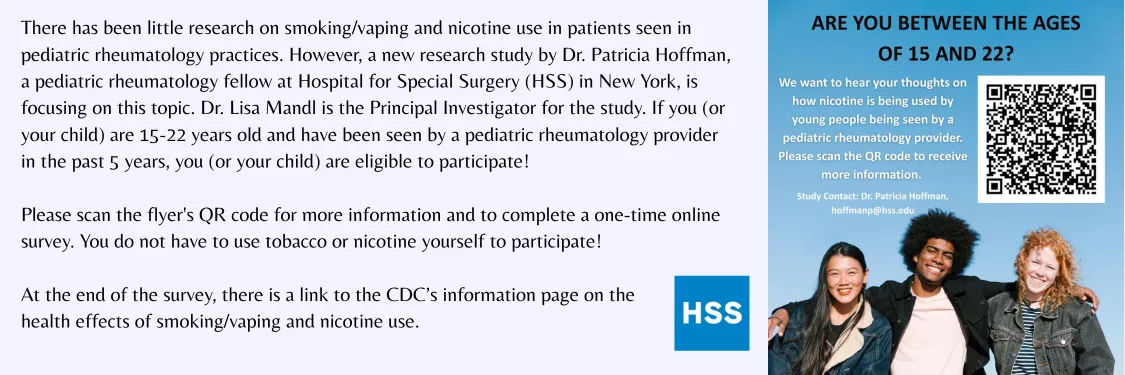About Arthritis
As the nation’s #1 cause of disability, arthritis affects nearly 60 million adults and 300,000 children. Over 100 types of arthritis and related conditions damage the joints and often other organs.
How can we assist you?
Helpful Tools for You

Your Genes Hold the Key: Understanding Genetic Testing and Personalized Medicine
Remember when doctors prescribed the same medication to everyone with the same condition, hoping it would work? Those days are quickly becoming history. Thanks to remarkable advances in genetic testing and personalized medicine, we're entering an exciting new era where your unique genetic blueprint can guide your healthcare decisions—especially if you're living with conditions like osteoarthritis.
What's All the Buzz About?
In April 2025, researchers made a groundbreaking discovery that has the medical community buzzing with excitement. Scientists conducted the largest genetic study ever performed on osteoarthritis, analyzing data from nearly 2 million people and discovering 962 genetic markers associated with the condition, including 513 that were never reported before.
But here's what makes this truly remarkable: ten percent of these newly identified genes are already targeted by medications approved for other conditions. This means doctors may soon be able to repurpose existing drugs to treat arthritis more effectively—and they'll know which ones will work best for you based on your genetic profile.
Think of it like having a personalized instruction manual for your body. Instead of the trial-and-error approach of trying different medications until something works, genetic testing can help your doctor identify the right treatment from the start.
What Exactly Is Personalized Medicine?
Let's break this down in simple terms. Personalized medicine (also called precision medicine) is an approach to healthcare that considers your individual genes, environment, and lifestyle when making decisions about preventing, diagnosing, and treating disease.
Here's a relatable example: You've probably noticed that medications affect people differently. One person takes a pain reliever and feels great relief within an hour, while their friend takes the same pill and experiences little benefit or even unwelcome side effects. That's because we all have genetic differences that affect how our bodies process medications.
Personalized medicine uses technologies like next-generation sequencing to analyze genetic mutations and guide treatment strategies tailored to each individual. It's healthcare designed specifically for you, not for the "average" patient.
How Does Genetic Testing Work in Real Life?
You might be wondering: "What would this actually look like for me?" Here's how genetic testing and personalized medicine are being used today:
For Medication Selection Before prescribing certain medications, your doctor might order a simple genetic test—usually just a cheek swab or blood sample. This test, called pharmacogenomic testing, reveals how your body processes different drugs. This helps doctors prescribe the right medication at the right dose based on your genetic profile, reducing the risk of side effects and increasing effectiveness.
For Disease Risk Assessment Genetic testing can identify whether you're at higher risk for developing certain conditions, including different types of arthritis. Armed with this knowledge, you and your doctor can develop prevention strategies or catch problems early when they're most treatable.
For Treatment Decisions The recent osteoarthritis genetic study provides valuable insights that could help tailor treatment strategies and enable improved patient selection for clinical trials. This means future treatments could be matched specifically to your genetic makeup.
The Real-World Benefits You Can Expect
So what does all this mean for you practically? Here are the tangible benefits:
Better Treatment Outcomes Instead of spending months or years trying different medications, genetic testing helps identify which treatments are most likely to work for you from the beginning. This means faster relief and less frustration.
Fewer Side Effects By identifying medications that your body processes well, you're much less likely to experience unwanted side effects. Personalized treatments based on individual gene profiles achieve higher therapeutic results with decreased side effects compared to standard one-size-fits-all therapy.
Early Detection and Prevention Genetic testing can identify disease risks before symptoms appear, allowing you and your healthcare team to take preventive action. This is particularly valuable for conditions like osteoarthritis, where early intervention can make a significant difference.
Cost Savings While genetic testing requires an upfront investment, it often saves money in the long run by eliminating the trial-and-error process and reducing hospitalizations from medication side effects.
What Does This Mean for Arthritis Patients?
If you're living with arthritis or worried about developing it, these advances are particularly exciting. The genetic research identified 700 genes with high confidence as being involved in osteoarthritis, and the study also revealed eight key biological processes crucial to the disease's development.
Understanding these genetic factors opens doors to:
More targeted medications that address the root causes of your specific type of arthritis
Better prediction of which patients will respond to particular treatments
Earlier diagnosis and intervention before significant joint damage occurs
Potential repurposing of existing medications that target your specific genetic markers
The Growing Accessibility of Genetic Testing
Here's more good news: genetic testing is becoming more accessible every year. The global genetic testing market is projected to reach nearly $50 billion by 2033, driven by technological advancements and burgeoning demand for personalized medicine. As the market grows, costs are coming down and availability is increasing.
Many doctors are now routinely ordering pharmacogenomic testing before prescribing medications, ensuring patients receive the right drug at the right dose based on their genetic profile. What once seemed futuristic is becoming standard practice at many medical centers.
What You Should Know Before Getting Tested
If you're considering genetic testing, here are some important points to discuss with your healthcare provider:
Insurance Coverage Many insurance plans now cover genetic testing when medically necessary. Check with your provider about what's covered and any out-of-pocket costs.
Genetic Counseling Understanding your genetic test results is crucial. Many healthcare systems offer genetic counseling services to help you interpret results and make informed decisions.
Privacy Considerations Reputable testing companies have strict privacy protections in place. Discuss privacy concerns with your doctor and carefully review any consent forms before testing.
Family Implications Since genetics are shared within families, your test results might have implications for your relatives. Consider how you'll handle this information.
Looking Ahead: The Future Is Bright
The pace of advancement in personalized medicine is breathtaking. The precision medicine market is estimated at $151.57 billion in 2024 and projected to reach $469.16 billion by 2034, reflecting healthcare's movement toward more personalized, data-driven approaches.
What does this mean for you? In the coming years, expect:
More genetic tests specifically designed for common conditions like arthritis
Faster turnaround times for test results
Integration of genetic information into routine healthcare appointments
Combination of genetic data with other health information (like lifestyle factors) for even more personalized recommendations
Taking Action: Simple Steps You Can Take Today
You don't have to wait for the future—you can start benefiting from personalized medicine approaches right now:
Talk to Your Doctor - Ask whether genetic testing might be appropriate for your situation, especially if you're starting a new medication or treatment plan.
Keep a Medication Log - Track how different medications affect you. This information, combined with genetic testing, provides valuable insights for your healthcare team.
Know Your Family History - Your family's medical history is a form of genetic information. Share this with your healthcare providers.
Stay Informed - Medical science is advancing rapidly. Stay up-to-date on new developments that might benefit your health.
Consider Participating in Research - Many medical centers are conducting genetic studies. Participating helps advance science and may give you access to cutting-edge testing.
The Bottom Line
Genetic testing and personalized medicine aren't just fancy buzzwords—they represent a fundamental shift in how we approach healthcare. Instead of treating everyone the same way, we're learning to tailor prevention and treatment to each person's unique genetic makeup.
For those living with conditions like osteoarthritis, or those concerned about developing them, these advances offer genuine hope. The recent breakthrough identifying hundreds of genetic markers for osteoarthritis is just the beginning. As research continues and technology advances, the dream of truly personalized healthcare is becoming reality.
Your genes hold valuable information about your health. With the right tools and guidance from your healthcare team, you can use this information to make better decisions about your care, potentially avoiding ineffective treatments and finding the approaches that work best for your unique biology.
The future of medicine is personal—and that future is arriving faster than we ever imagined.
Want to Learn More?
Talk to your healthcare provider about whether genetic testing might be right for you. Many major medical centers now have personalized medicine programs that can guide you through the process and help you understand how your genetic information can improve your care.
The information in this article is for educational purposes only and should not replace professional medical advice. Always consult with your healthcare provider before making decisions about genetic testing or treatment options.

Effects of Arthritis

Cause of Disability
In the United States, 23% of all adults, or more than 54 million people, have arthritis. It is a leading cause of work disability, with annual costs for medical care and lost earnings of $303.5 billion.

Workforce Effects
Sixty percent of US adults with arthritis are of working age (18 to 64 years). Arthritis can limit the type of work they are able to do or keep them from working at all.

Global Impact
In fact, 8 million working-age adults report that their ability to work is limited because of their arthritis. For example, they may have a hard time climbing stairs or walking from a parking deck to their workplace.
Promoting Interventions That Reduce Arthritis Pain
American Arthritis Foundation recognizes several proven approaches to reduce arthritis symptoms:
Be active. Physical activity—such as walking, bicycling, and swimming—decreases arthritis pain and improves function, mood, and quality of life. Adults with arthritis should move more and sit less throughout the day. Getting at least 150 minutes of moderate-intensity physical activity each week is recommended.
Protect your joints. People can help prevent osteoarthritis by avoiding activities that are more likely to cause joint injuries.
Talk with a doctor. Recommendations from health care providers can motivate people to be physically active and join a self-management education program. Should your arthritis be interfering with your activities of daily living you may be a candidate to receive many new treatments, and learn how to reverse the arthritis condition.



